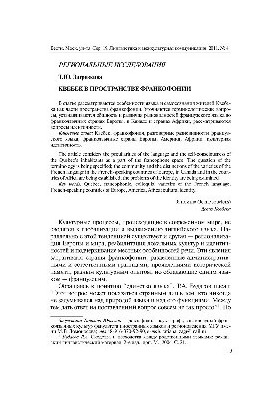Bulletin of Moscow University. Series 19. Linguistics and intercultural communication. No 4
 Instant download
Instant download
after payment (24/7)
 Wide range of formats
Wide range of formats
(for all gadgets)
 Full book
Full book
(including for Apple and Android)
Journal of Moscow University . Series 19. Linguistics and Intercultural Communication . No. 4”, published by the team of authors, is a unique collection of articles devoted to topical issues of linguistics and intercultural communication . This work will be a real discovery for all those who are interested in language as a tool of communication and cultural exchange, as well as for those who seek to understand more deeply how language shapes our perception of the world. This issue of Vestnik collects research that covers a wide range of topics from the theoretical foundations of intercultural communication to practical aspects related to the use of language in multilingual and multicultural environments. Readers will be able to immerse themselves in the analysis of various linguistic phenomena, as well as learn about the influence of cultural factors on the process of communication. Each article offers a unique perspective on the problem and emphasizes the importance of taking cultural context into account in linguistic research. This book will be of particular interest to students, graduate students and teachers of language and cultural studies disciplines, as well as specialists in the field of intercultural communication .. It will be a useful resource for those working in an international environment where understanding cultural differences and the nuances of language play a key role. It will also attract the attention of anyone interested in sociolinguistics, psycholinguistics and cultural anthropology. One of the main topics raised in this issue is the impact of globalization on language practice and intercultural interaction. With the rapid development of technology and increasing migration of people around the world, issues related to language barriers and cultural differences are becoming especially relevant. The authors examine how modern communication technologies change the way information is communicated and perceived, and how they influence the formation of identity and cultural norms. The style of the authors is characterized by a high level of scientific rigor and depth of analysis, which makes the texts not only informative, but also fascinating to read. Each author makes his own unique contribution, enriching the overall picture of the study. This creates a multifaceted and diverse context that will allow the reader to see the problem from different angles. Journal of Moscow University . Series 19. Linguistics and Intercultural Communication . No. 4" not only expands the horizons of knowledge in the field of linguistics, but also inspires further research. It can become a basis for discussions at seminars and conferences, and also serve as a source of ideas for future scientific works. If you are looking for literature that will help you better understand the complex mechanisms of intercultural communication, as well as give you the opportunity to look at language as a living and dynamic tool, this book will be an excellent choice. It will not only enrich your knowledge, but also help you develop the critical thinking necessary to analyze contemporary linguistic and cultural phenomena. Do not miss the opportunity to get acquainted with the works of leading researchers in the field of linguistics and intercultural communication, which will help you to open new horizons in understanding language and culture. The Bulletin of Moscow University is not just a book, it is the key to understanding the diversity of human communication.
LF/767320986/R
Data sheet
- Name of the Author
- Collective of authors
- Language
- Russian


























